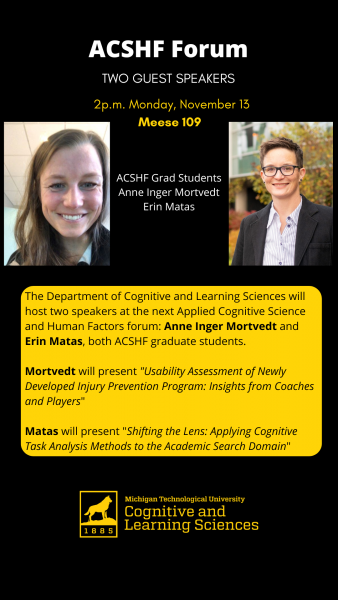The Department of Cognitive and Learning Sciences will host two speakers at the next Applied Cognitive Science and Human Factors forum: Anne Inger Mortvedt and Erin Matas, both ACSHF graduate students. Their presentations will be from 2:00 to 3:00 p.m. Monday November 13 in Meese 109.
Mortvedt will present “Usability Assessment of Newly Developed Injury Prevention Program: Insights from Coaches and Players”
Abstract:
This study explores the perceptions of coaches and handball players regarding an 8-week injury prevention program aimed at reducing ACL injuries. Semi-structured interviews were conducted with coaches and a sample of players who participated in the program, providing in-depth qualitative insights about what usability characteristics affect use of an exercise program. Coaches expressed concerns about program efficiency and perceived effectiveness, leading to hesitancy in adopting it for the long term. They stressed the importance of player education and understanding, the need for adaptability in program implementation, and a “propose” rather than “impose” approach. Players had mixed feelings about the program, appreciating perceived improvements in some exercises but finding it too time-consuming and lacking evidence of effectiveness. They proposed ideas to make the training more enjoyable, emphasizing the significance of perceived effectiveness and efficiency, but also introducing playful ways to implement injury prevention training. The study underscores the importance of perceived effectiveness, program efficiency, and player enjoyment in designing successful exercise interventions. These findings can inform the development of an exercise intervention usability scale, enhancing program adoption and long-term adherence.
Matas will present “Shifting the Lens: Applying Cognitive Task Analysis Methods to the Academic Search Domain”
Abstract:
Although the information-seeking behavior of undergraduate students in library search has been examined, the role that cognitive complexity plays in search remains largely unexplored. In a pilot study, students participating in a library search exercise were interviewed using Cognitive Task Analysis (CTA) methods to explore their mental models of the search task. Results from CTAs, such as task diagrams and concept maps, captured the cognitively complex elements for students and will be compared to expert search strategies. Implications for this work to support new library system evaluation and future experiments are discussed. Future experiments will delve deeper into practical strategies for mitigating cognitive complexity and improving search, making search more accessible and effective for people.
